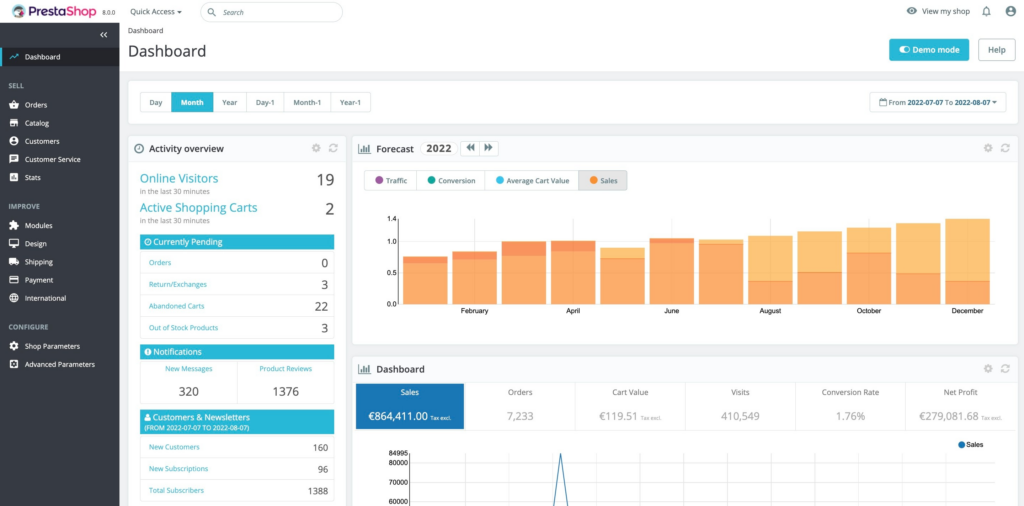A Detailed Comparison of Shopify vs. Prestashop Ecommerce Platforms
Table of Contents
Toggle
As we approach 2024, the ecommerce landscape brims with newfound dynamism and innovation. This article dives deep into the technical aspects of two leading ecommerce platforms – Shopify and Prestashop, assessing their unique features, advantages, and potential drawbacks to help you make an educated choice.
Shopify
Shopify is a cloud-based e-commerce platform that allows individuals and businesses to create and manage their own online stores. It provides a range of features and tools to help merchants sell products, process payments, manage inventory, and track sales. Shopify is known for its ease of use, scalability, and robustness, making it accessible to businesses of all sizes. With its extensive library of themes and plugins, Shopify allows merchants to create a unique and visually appealing online store that can be customized to match their brand.
In technical terms, Shopify is a sales platform offered as a subscription-based software-as-a-service (SaaS). Shopify offers three standard store subscription plans with fees beginning at $25 USD per month for individuals and small businesses. This includes everything you need to create your store, ship products, and process payments. All standard plans support the creation of a branded online store and provide a comprehensive range of tools for both in-person and online selling.
Additionally, Shopify provides a “Starter” plan at a cost of just $5 USD per month. While it does not include an online store, this plan supports mobile point-of-sale (POS) sales and offers a Buy Button for selling on external websites, blogs, and through email.
Every plan offered by Shopify encompasses a complete suite of business management tools. Essential functionalities such as product sourcing, sales and inventory tracking, payment processing, shipping, customer accounts, marketing, and reporting are integrated into each Shopify plan. Moreover, you have the option to easily expand your Shopify toolkit by incorporating numerous Shopify Apps. To learn more about Shopify, please refer to our comprehensive Shopify review below.
Advantages of Shopify
1. User-Friendly Design: Shopify’s intuitive interface and user-friendly design facilitate even the least tech-savvy users to build and manage an online store. The platform offers a simple setup process, and its drag-and-drop interface enables effortless customization.
2. Versatile Theme Options: Shopify provides access to a plethora of professionally designed, responsive themes, ensuring your ecommerce site’s optimal performance and visual appeal across all devices, including desktops and mobile devices.
3. Robust App Marketplace: The Shopify App Store houses over 8,000 apps that can significantly enhance your site’s functionality. The range of apps covers advanced analytics, email marketing tools, shipping and inventory management, and direct sales channel integration.
4. 24/7 Customer Support: Shopify provides continuous customer support round the clock. Their support team is reachable via email, live chat, or phone, ensuring immediate assistance when required.
Limitation of Shopify
1. Cost Structure: Shopify’s cost structure can be relatively higher than other ecommerce platforms. It involves a monthly subscription fee, transaction fees (unless you opt for Shopify Payments), and additional costs for premium themes or apps.
2. Limited Customization Scope: Despite being user-friendly, Shopify’s customizability is somewhat limited if you aim to make profound customizations to your site. Significant changes to the site’s basic structure might necessitate hiring a developer.

The latest Shopify improvements for 2024
As Shopify continues to push the boundaries of e-commerce innovation, businesses can leverage these new features and advancements to stay ahead in the competitive online marketplace. Whether you’re a small startup or an established enterprise, Shopify provides the tools and flexibility to help fuel your e-commerce success. These improvements include:
- Streamlined Store Setup: Shopify has introduced a simplified onboarding process making it easier for entrepreneurs to set up their online stores. From seamless theme selection to intuitive product management, getting started with Shopify is now much easier.
- Enhanced Mobile Experience: Recognizing the growing importance of mobile commerce, Shopify has prioritized mobile optimization across its platform. With responsive themes and a mobile-friendly checkout process, businesses can provide a seamless shopping experience on smartphones and tablets, capturing the attention of an increasingly mobile-savvy consumer base.
- Robust App Ecosystem: Shopify’s app ecosystem has expanded exponentially, offering a wide range of third-party integrations and extensions. From marketing and analytics tools to inventory management solutions, businesses can customize their Shopify stores with ease, tailoring them to their unique requirements.
- Advanced Selling Features: Shopify has unveiled powerful selling features designed to boost conversion rates and drive sales. From dynamic product recommendations to personalized discounts and abandoned cart recovery, businesses can leverage these tools to optimize their customer journey and maximize revenue.
- International Expansion Made Easy: Breaking down geographical barriers, Shopify has introduced an array of features to facilitate global expansion. With multi-currency support, localized language options, and international shipping integrations, businesses can seamlessly tap into new markets and cater to a diverse customer base.
- Improved Analytics and Reporting: Shopify’s enhanced analytics and reporting capabilities provide businesses with valuable insights into their performance and customer behavior. From real-time sales data to detailed customer segmentation, merchants can make data-driven decisions to refine their strategies and drive growth.
- Enhanced Security and Reliability: Shopify prioritizes the security and reliability of its platform, ensuring businesses can operate with peace of mind. With robust data encryption, PCI compliance, and regular backups, merchants’ online stores are safeguarded against potential threats.
Prestashop
Prestashop is an open-source e-commerce platform that provides merchants with a comprehensive and flexible solution to set up and manage their online stores. It offers a wide range of features and tools to help merchants create attractive and user-friendly websites, manage products and inventory, process payments, and analyze sales data. With its intuitive interface and customizable design options, Prestashop allows merchants to create a unique and branded online presence that can attract and engage customers effectively.
On November 25, 2021, a significant development took place in the e-commerce realm as Mail Boxes Etc, the renowned Italian platform, announced its acquisition of PrestaShop, the popular French e-commerce solution. With this acquisition, PrestaShop undergoes a transformation, transitioning into a PrestaShop project, bringing forth a host of changes and improvements.
One notable change in the new version of PrestaShop is the exclusion of commercial products and services that were previously built-in as native modules. Instead, users now have the freedom to personalize their PrestaShop experience by installing add-ons directly from the module manager page, just like any other PrestaShop module and theme package.
This development carries several advantages for both users and our dedicated team. Gone are the days of relying solely on default plugins when setting up your online store. Now, you have the flexibility to choose from an extensive selection of high-quality modules available on our PrestaShop Marketplace Addons. This helps you to select and integrate modules that align with your unique business needs, ensuring a tailored and optimized e-commerce experience.
The acquisition of PrestaShop by Mail Boxes Etc. introduces a significant and transformative period, brimming with possibilities and enhanced functionality. The newfound independence of PrestaShop as a PrestaShop project opens up a world of opportunities for online merchants seeking to elevate their e-commerce ventures.

Prestashop 8: Latest Improvements and Updates for 2024
The latest version of PrestaShop brings a range of exciting updates that are set to enhance the overall user experience and improve the security of your online store. Let’s explore some of the key improvements:
- Revamped Product Pages: Managing your product catalog becomes even more efficient with the enhancement of the product page in the PrestaShop back office. Experience a streamlined interface that empowers you to effortlessly update and showcase your products, ensuring a seamless browsing experience for your customers.
- Strengthened Password Policy: Security is paramount, and PrestaShop recognizes the importance of protecting both your customers and employees. With the new security page, conveniently located under the advanced parameters menu in the back office, shop administrators can now enforce password policies. Choose between simple passwords or opt for longer, more complex ones to ensure maximum security. The core development team has implemented safeguards by limiting the length and complexity of options within these security settings.
- Enhanced PrestaShop Compatibility: PrestaShop embraces the latest technological advancements by offering compatibility with PHP versions 7.2 to 8.1. This ensures that your online store remains up to date and optimized for performance. Additionally, the update to Symfony 4.4, a popular PHP framework, further enhances the stability and efficiency of your PrestaShop store.
These enhancements in the latest PrestaShop update signify a commitment to providing merchants with an even more secure and user-friendly e-commerce platform. By leveraging these new features, you can optimize your product management, safeguard sensitive information, and ensure seamless compatibility with modern technology standards.
Advantages of Prestashop
1. Free and Open Source: Prestashop’s primary attraction is its free and open-source nature. This feature grants you absolute freedom to modify and customize your store as you desire, with a robust active community for assistance.
2. Advanced Customization: Prestashop stands out due to its extensive customization options. If you possess coding skills or have access to a developer, you can design a unique online store that matches your vision.
3. Multilingual and Multi-currency Support: Prestashop natively supports over 75 languages and multiple currencies, making it an ideal choice for businesses targeting international markets.
Limitations of Prestashop
1. Steep Learning Curve: Prestashop’s advanced customization options result in a steeper learning curve compared to more user-friendly platforms like Shopify.
2. Lack of Official Support: Unlike Shopify, Prestashop does not offer official support. You’ll have to rely on community forums or hire a developer for troubleshooting.
3. Additional Costs: Although the platform itself is free, additional costs for web hosting, SSL certificates, and potentially premium themes or modules need to be considered.
PHP 8 Compatibility in PrestaShop Version 8
Unleash unprecedented speed and elevate your store’s performance with PHP 8 compatibility in PrestaShop Version 8.
You can elevate your store’s performance with PHP 8 compatibility in PrestaShop Version 8. Prepare to witness huge improvements in your PrestaShop store’s speed and performance with the highly anticipated compatibility of PrestaShop version 8 with PHP 8. This latest update is said to provide exceptional outcomes, making it a pivotal advancement in the PrestaShop ecosystem.
Undoubtedly, the compatibility with PHP 8 stands as the most significant change in PrestaShop version 8. By harnessing the power of PHP 8, your online store gains a substantial boost in performance, resulting in faster page load times and optimized response rates. The combination of PrestaShop’s robust features and PHP 8’s cutting-edge capabilities unlocks a new level of efficiency and speed for your e-commerce operations.
With this integration, PrestaShop ensures that your store stays at the forefront of technology, enabling you to provide an exceptional user experience to your customers. The performance enhancements offered by PHP 8 compatibility helps you to handle increased traffic effortlessly, enhance conversion rates and increase customer satisfaction.
As a merchant, you can look forward to improved search engine rankings, reduced bounce rates, and increased customer engagement. PrestaShop version 8 sets the stage for great success in the dynamic world of online retail.
Conclusion
The decision between Shopify and Prestashop hinges on your specific requirements and resources. If you prefer a platform that’s easy to set up and manage, with excellent customer support, Shopify could be your ideal choice. Conversely, if you’re seeking a more flexible platform and can handle a learning curve (or have access to a skilled developer), Prestashop might be the better alternative.
Remember, the most effective ecommerce platform is the one that aligns with your business needs and goals. Shopify and Prestashop both provide a wealth of options, so invest time in analyzing your requirements and exploring these platforms before making a final decision.
To set up your Shopify store click here
To set up Prestashop store click here
Feel free too check out our Shopify and Prestashop Addons to help improve your ecommerce store: https://toolecommerce.com/




